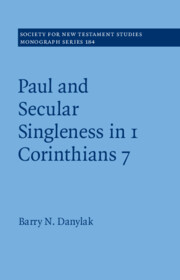Book contents
- Paul and Secular Singleness in 1 Corinthians 7
- Society for New Testament Studies Monograph Series
- Society For New Testament Studies Monograph Series
- Paul and Secular Singleness in 1 Corinthians 7
- Copyright page
- Contents
- Figures
- Tables
- Acknowledgements
- Abbreviations
- 1 Introduction and Methodology
- 2 The Demographic Shape of Secular Singleness
- 3 The Ideological Shape of Secular Singleness
- 4 The Context of 1 Corinthians 7
- 5 The Crux of 1 Corinthians 7
- 6 The Content of 1 Corinthians 7
- 7 Findings and Conclusions
- Appendix Individuals from the Egyptian Census Classified by Age
- Bibliography
- Ancient Sources Index
- Author Index
- Subject Index
2 - The Demographic Shape of Secular Singleness
Published online by Cambridge University Press: 28 March 2024
- Paul and Secular Singleness in 1 Corinthians 7
- Society for New Testament Studies Monograph Series
- Society For New Testament Studies Monograph Series
- Paul and Secular Singleness in 1 Corinthians 7
- Copyright page
- Contents
- Figures
- Tables
- Acknowledgements
- Abbreviations
- 1 Introduction and Methodology
- 2 The Demographic Shape of Secular Singleness
- 3 The Ideological Shape of Secular Singleness
- 4 The Context of 1 Corinthians 7
- 5 The Crux of 1 Corinthians 7
- 6 The Content of 1 Corinthians 7
- 7 Findings and Conclusions
- Appendix Individuals from the Egyptian Census Classified by Age
- Bibliography
- Ancient Sources Index
- Author Index
- Subject Index
Summary
For a variety of reasons, it is often presumed that the ancient Mediterranean world of Roman Corinth was a culture of near universal marriage. Peter Laslett, for example, classified household composition in traditional Europe into four broad categories based on geographical region: the West, the West/central, the Mediterranean, and the East.1 The Mediterranean household in Laslett’s typology (including Greece and what was Roman Corinth) was characterized by high proportions of both male and female marrying and a low proportion of solitary households.2 From her extensive analysis of Roman sources, Susan Treggiari also has concluded that there was a strong cultural disposition toward marriage and it was rare for a man to reach age sixty without having married, at least among the propertied classes.3 The case has been further bolstered by later studies and some demographic modelling from the same period.4
- Type
- Chapter
- Information
- Paul and Secular Singleness in 1 Corinthians 7 , pp. 41 - 86Publisher: Cambridge University PressPrint publication year: 2024

